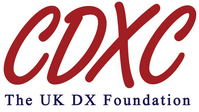A Brief History of CDXC
CDXC, the UK's first and largest group of HF, DX and contest-oriented radio amateurs, was founded in the early 1980's by a small group of keen HF DXers in the Chiltern Hills of South East England. CDXC, which quickly developed into a national then international DX foundation, is for amateurs with an interest in competitive activity on the HF bands (DXing, contesting and award chasing, etc.). As at the end of 2017 there are just under 800 members.
CDXC Objectives
To fund DXpeditions
A major aspect of CDXC activity is the sponsoring of HF DXpeditions, ranging from donations and provision of equipment for smaller operations, to large-scale logistical support - for example, to the highly successful VP8SSI (South Sandwich) and 3Y0PI (Peter 1) DXpeditions when team members were accommodated by CDXC during their UK stopovers. However, our funds are limited, so we have to be selective and make sure that the DXpedition is well organised and that UK amateurs, in particular, will have a reasonable chance of making contacts. About half of our income can be made available for this purpose. This means that we can fund DXpeditions to the tune of around £4,000 p.a. or, say, up to 15 DXpeditions p.a. We are now one of the most significant funding organisations in the world for DXpeditions. To fund more DXpeditions we need more members. We have recently published our guidelines for sponsoring DXpeditions. We have supported many DXpeditions in recent years including the D68C DXpedition to the Comoros Islands in February 2001. This DXpedition was conceived and organised by CDXC members. The 9M0C (Spratly Island), 3B9C (Rodrigues Island) and 3B7C (Saint Brandon) DXpeditions were made up almost entirely of CDXC members.
We also make a substantial donation to IREF each year in support of rare IOTA DXpeditions.
To encourage and support the younger and newer amateurs
A significant number of members joining in recent years was substantially younger than our average membership. This has been extremely encouraging. A club like CDXC needs new blood, new ideas and new initiatives, and we need to do whatever we can to encourage the newer and younger amateurs to join CDXC. Just think about the HF Convention. It is almost totally dependent on CDXC members doing their bit but it is the same 20/30 each year who are involved in lecturing and organising. We really do need more young members.
To publish an excellent quarterly magazine
The past years have seen not only an increase in size of the CDXC Digest but also an increase in quality, both of the content and of the finished product. It is a full colour magazine available in print form and electronically from our website. Our thanks, of course, go to our Editors. Producing typically 50/60 pages every quarter is a major challenge. The comment that has now been made on several occasions is, " It's the one ham radio publication I read from cover to cover". That says it all!
To create an environment where members can meet
Our main social get-togethers take place at the Annual Dinner, usually in the Spring, the AGM and Summer Social and at the RSGB Convention. These events are well supported - the CDXC stand at the HF Convention is usually very busy! We attend several of the major rallies and there are also the "unscheduled" meetings with visiting overseas DXers as and when opportunities arise.
To issue achievement awards
The Penallt Trophy is awarded to the club member who contacts the greatest number of countries on the LF bands during March each year. Full rules are shown here. The RSGB CDXC Cup is awarded to the leading single operator UK/ Channel Islands/ Isle of Man entrant in the CQ Worldwide SSB Contest High Power, Single Operator Section. Plaques are awarded to the leading UK stations in the CQ Worldwide CW and SSB Contests Low Power Sections. The club issues Merit Awards recognising outstanding contributions to HF DXing and also supports the Geoff Watts Memorial Trophy for the annual RSGB IOTA Contest. The RSGB IOTA 40th Anniversary Programme "IOTA 2004" was managed by CDXC.
To keep the club on a sound financial basis and well administered
We keep a minimum of six months' membership income in the bank. We try to deal with membership applications, badge and Digest distribution and members' correspondence efficiently.

